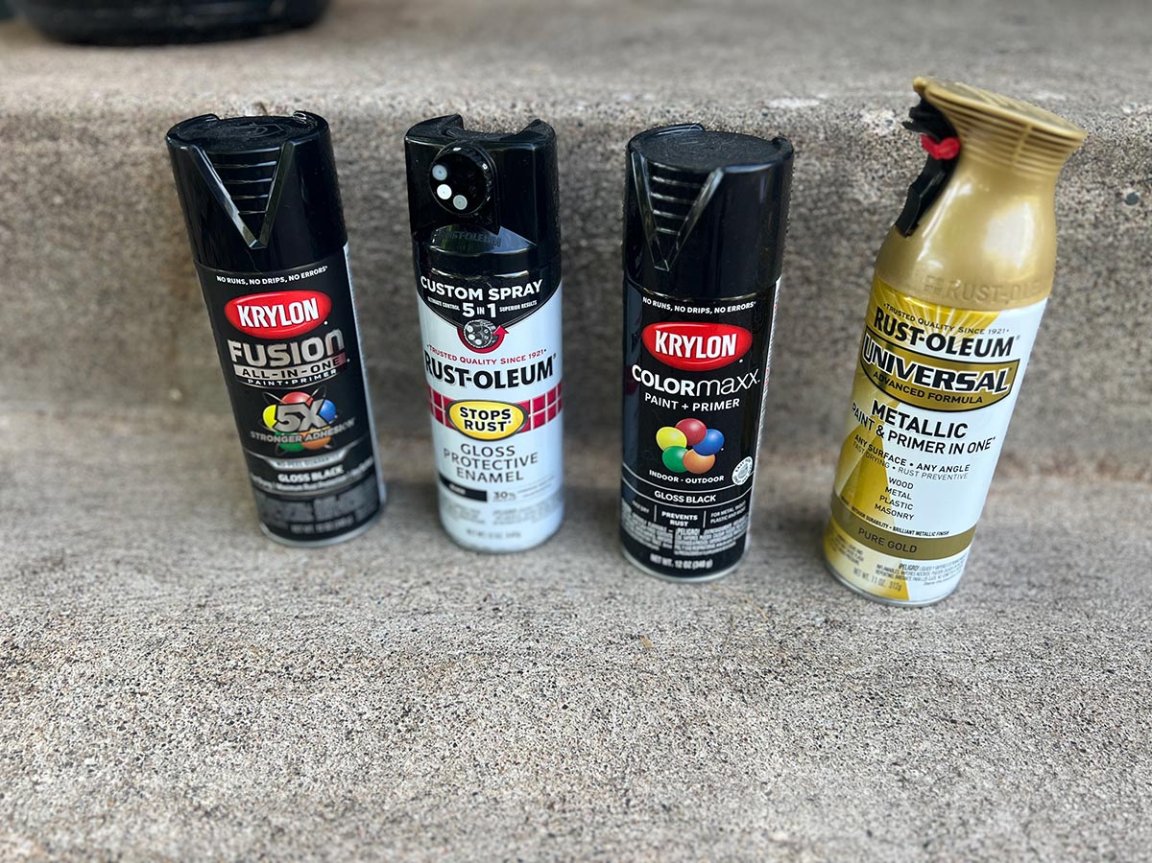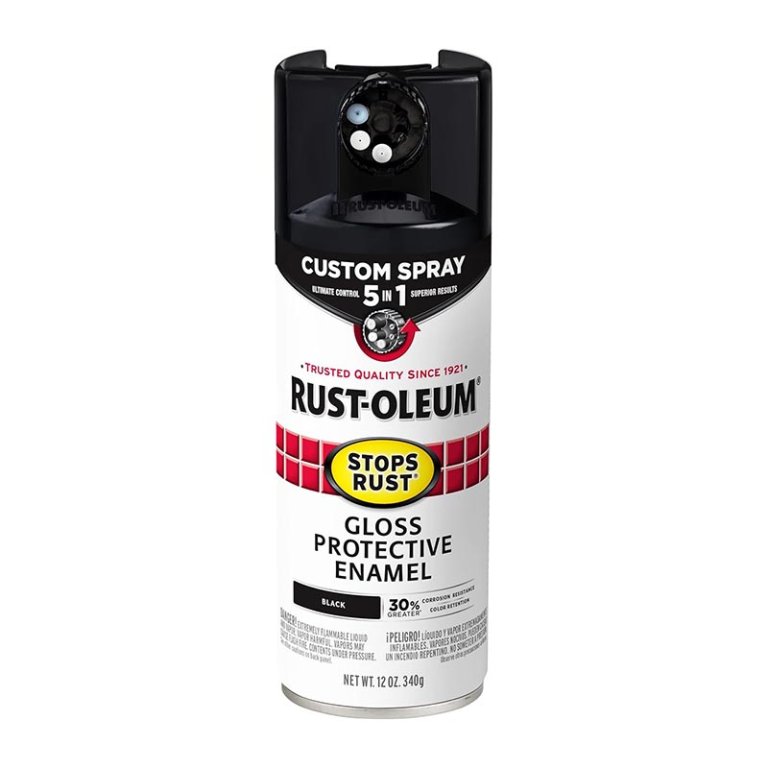We may earn revenue from the products available on this page and participate in affiliate programs. Learn More ›
When it comes to giving new life to old objects, the best spray paints for metal can transform something worn and outdated into something that looks new again. From patio furniture to light fixtures, metal spray paints should be easy to apply, long lasting, and capable of withstanding the elements.
The best paints are designed to adhere to various types of metal surfaces without chipping or flaking. We recently tested five spray paints for metal on both rounded and flat metal objects. We sprayed, scraped, and even blasted these items with water to measure their durability. Our top choice was Rust-oleum Stops Rust 5-in-1 Spray Paint. Not only did this spray paint go on easily, it was also the most durable of those tested, providing big color coverage and a scratch-resistant surface.
Whether it’s to spruce up a set of metal furniture or transform a chandelier, before buying metal spray paint, buyers will want to know just what they’ll be holding in their hands. Durability, drying time, and how far a single can will go are all important factors in determining the best spray paints for metal projects of any kind.

| Testing Stats | |
| Products tested | 4 |
| Time spent testing | 1 week |
| Tests performed | 5 |
| Price range | $7 to $13 |
Best Overall
Rust-Oleum Stops Rust 5-in-1 Protective Enamel Spray Paint
See ItWhat We Like
- 5 different spray patterns to choose from
- Fast and effective coverage
- Scratch-resistant and durable
- Rich color that matched the label
What We Don’t Like
- Slightly longer drying time than others we tested
- Less coverage per can than other competitors
Product Specs
- Base: Oil
- Indoor or outdoor: Both
- Finish: Gloss, semi-gloss, matte, satin, or flat
- Other features: 5-in-1 spray; resistant to rust, scratches, chipping, and fading
Our Ratings: Ease of Use 5/5; Coverage 5/5; Appearance 5/5; Durability 5/5; Value 5/5
This option from Rust-Oleum is an oil-based enamel spray paint that comes in a wide range of colors and finishes, including matte, satin, semi-gloss, and gloss. Its standout feature is the unique dial on the top, which can adjust the spray pattern, granting the user a level of control that other spray paint cans simply don’t offer. The five adjustment settings include high output, standard, low output, vertical fan, and horizontal fan. This allows for versatility in coverage. For example, when painting a large flat surface area, the horizontal fan casts a wider spray for faster coverage. If using this for a smaller, detailed project or a light coat of touch ups, the low output can help control the paint, preventing the user from overspraying and wasting product. While all the metal spray paints we tested offered good coverage, this added versatility helped set the Rust-Oleum Stops Rust 5-in-1 spray paint apart. It’s suitable for both indoor and outdoor projects, too.
When spraying both flat and curved surfaces, the coverage took just seconds. The gloss was truly gloss black, and we found it to be identical to the as-advertised color. Ultimately, though, what really made this the best overall spray paint for metal was its durability. After allowing the paint to dry between coats (1 to 2 hours) and then completely cure in 24 hours, we performed a series of tests on the sprayed surfaces that included scratching the surface with our fingernails, a key, and garden shears. Of all the spray paints for metal that we tested, this one held up the best, with minimal damage.
Get the Rust-Oleum Stops Rust spray paint for metal surfaces at Amazon, Lowe’s, or The Home Depot.

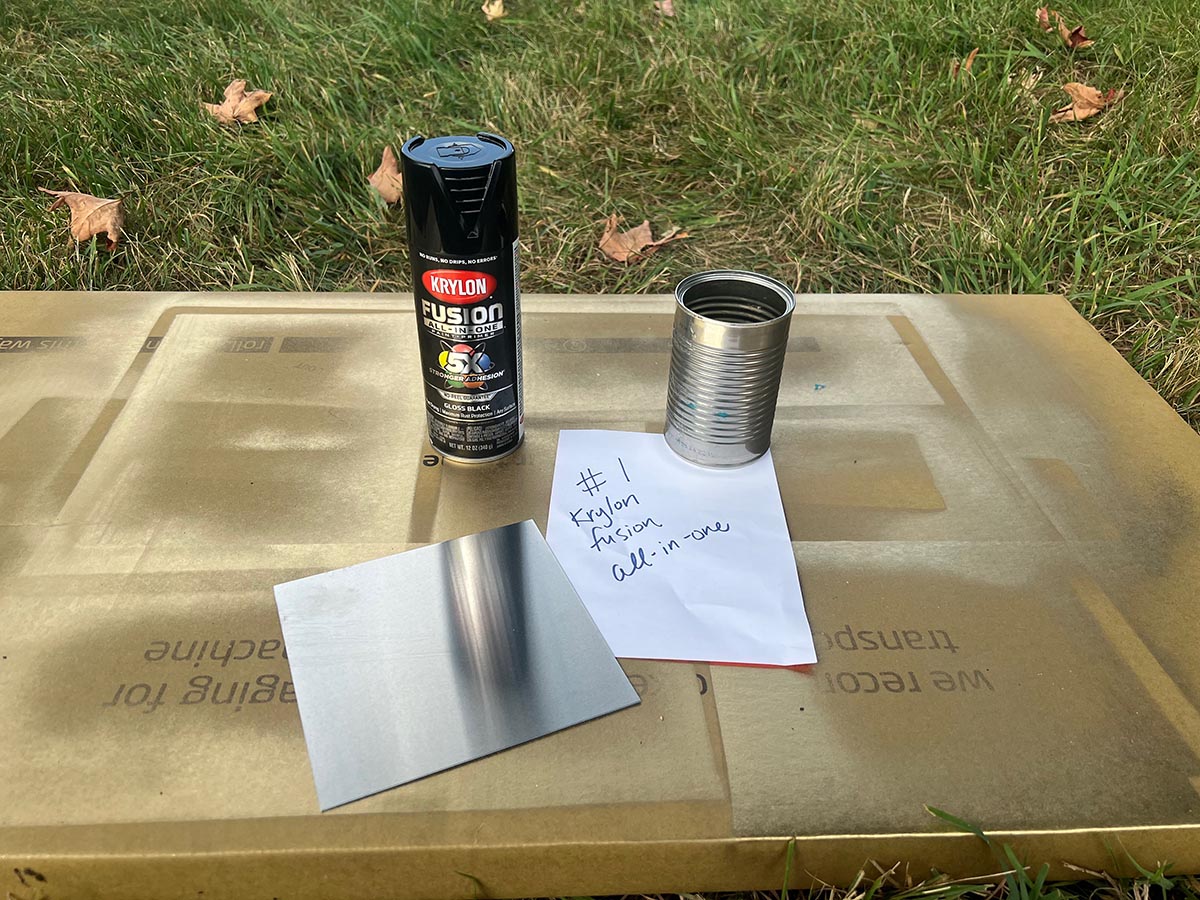
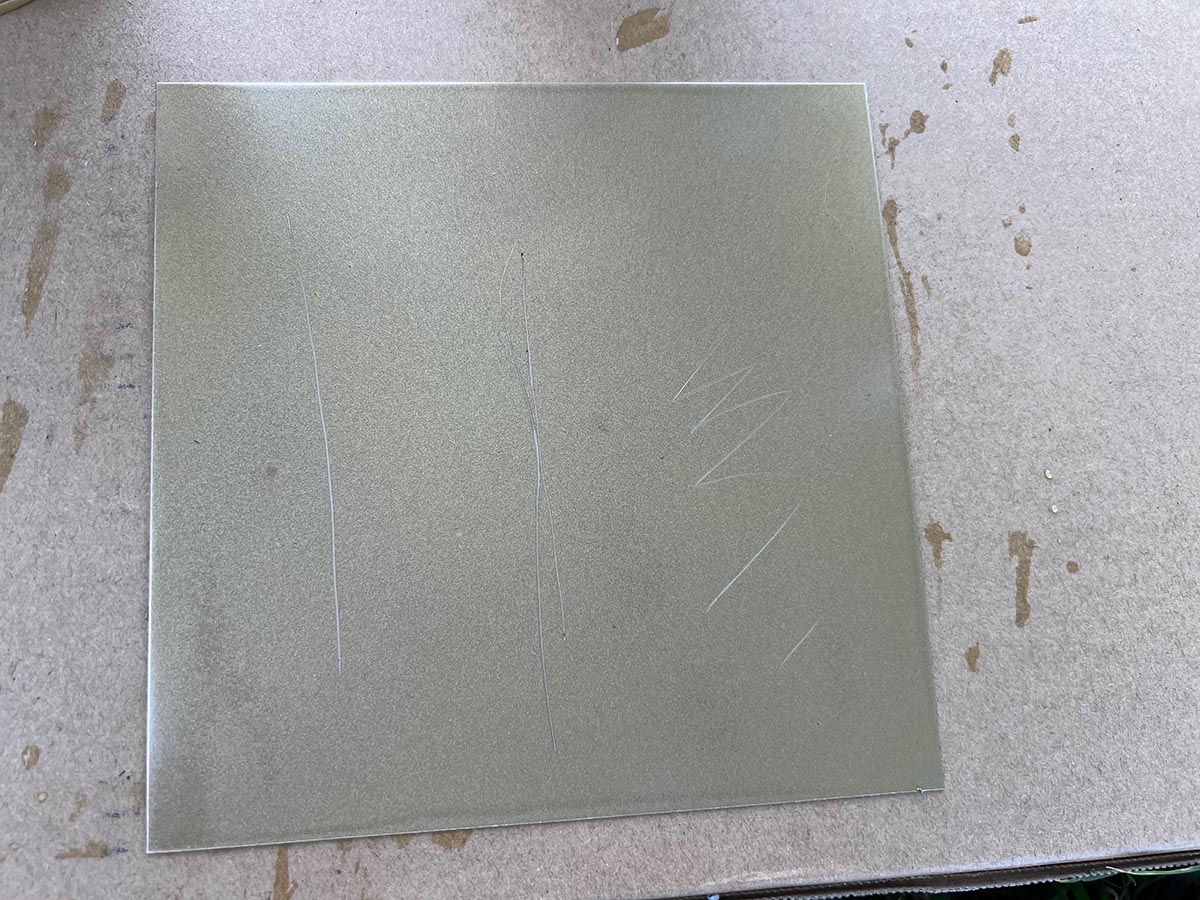
More Spray Paints for Metal That Are Worth Your Money
Although there could only be one top pick, we tested other spray paints for metal too, and we think a few of them are worth investing in. In particular, when shopping for a metallic spray paint, the Rust-Oleum Universal Premium Metallic Spray Paint got high marks for coverage and durability. The others that we tested also provided excellent coverage, deep color, and a true-to-stated finish, but they weren’t as durable or scratch-resistant as our Best Overall pick. All of the spray paints we tested are labeled for indoor and outdoor use; we recommend them as good alternatives for a variety of metal painting projects as long as they’re used according to the manufacturer’s guidelines.
- Rust-Oleum Universal Premium Metallic Spray Paint, available at Amazon, Lowe’s, or Target.
- Krylon COLORmaxx Spray Paint and Primer, available at Amazon or Walmart.
- Krylon Fusion All-In-One Spray Paint, available at Amazon, Lowe’s, or Ace Hardware.
How We Tested the Best Spray Paints for Metal
To put the best spray paints for metal to the test, we created a mini testing lab that allowed us to test five different brands of spray paint individually. We tested for ease of use, color saturation, ability to coat, value, and durability.
The durability tests were by far the most intensive. Following the manufacturer’s instructions for each can of spray paint, we tested every paint on an individual 6-inch-long by 6-inch-wide aluminum sheet as well as on a tin-coated steel can, like those used for food.
Drying time ranged from 20 minutes to 2 hours, so we allowed for a single coat to dry, then applied a second coat and let each sprayed object sit for a little over 24 hours. Once completely cured, we dropped each object from a height of about 6 feet onto concrete and took note of any scratches or chips. Next, we scratched at each surface with our fingernails, a heavy-duty house key, and the blade of a pair of garden shears. Again, we took note of how well each paint held up to these various factors. Finally, although the paints did not claim to be water-resistant per se, we decided to blast them with the hose to see how well the fresh paint held up. We also left them out in the sun and light rain for several days to see how they endured the elements.
We took note of how well the product coated each surface, how true to color it was, and how easy it was to use, as well as making general notes about each product. Finally, we considered value. While some paint manufacturers claimed their product covered more square footage per can, overall value came down to how long we thought a paint would last. An inexpensive paint that doesn’t hold up over time costs more to replace than a slightly more expensive one that endures.
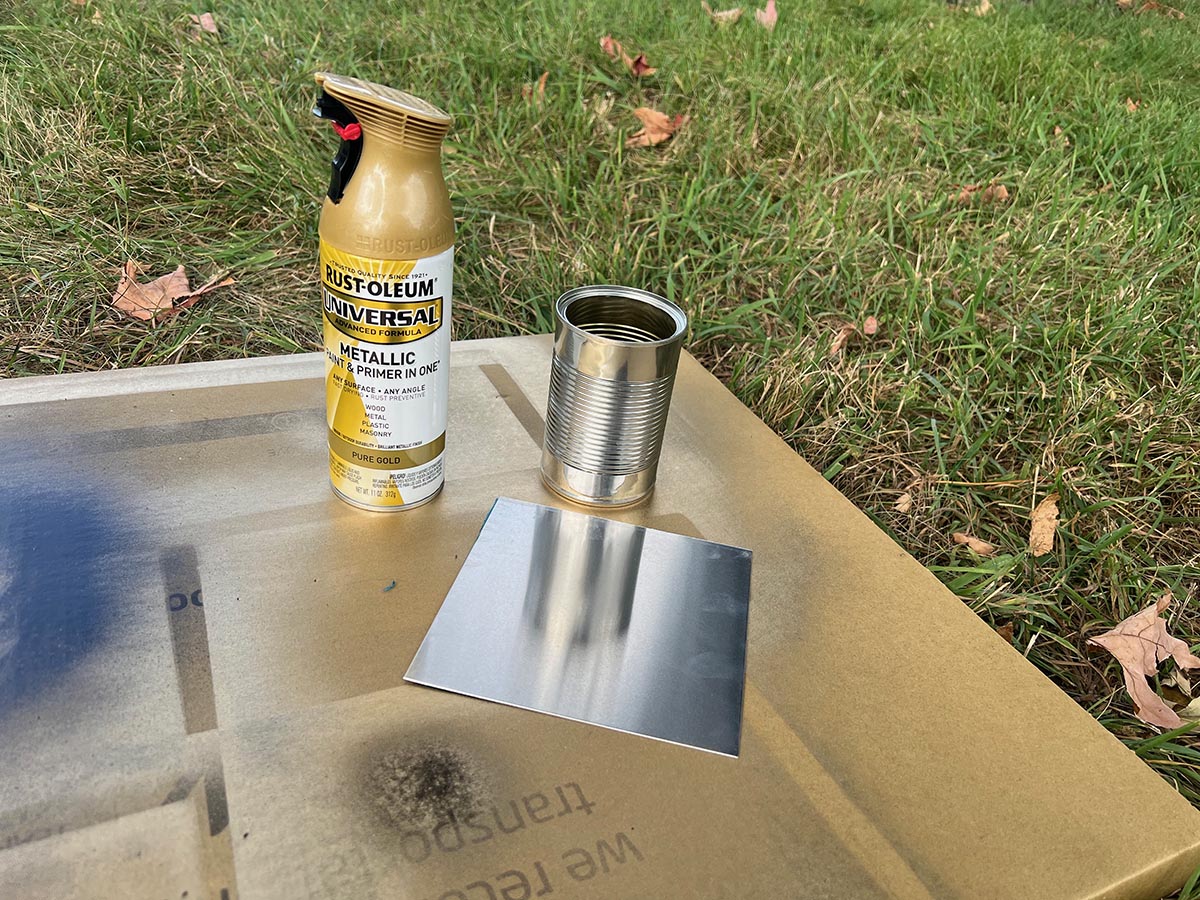
What to Consider When Choosing the Best Spray Paint for Metal
Whether you’re shopping for spray paint to touch up a metal shed, add a pop of color to your latest metalworking project, or something else entirely, there are a few factors to consider before making a purchase.
Type of Paint
When deciding on spray paint for repairs or touching up a metalworking project, you’ll want to consider paint that is designed for the material and the environment. This can include choosing a water-based acrylic, an oil-based enamel, or a spray paint that’s specifically intended for indoor or outdoor use. For instance, an indoor spray paint may not have the same water resistance and durability as outdoor spray paint but may come in more color options. Think about where the project or item you want to spray paint will be situated when making your decision.
Finish
Some spray paints have a range of finishes, such as gloss, matte, satin, flat, hammered, textured, or metallic, each of which will give the metal surface a distinct look. Also, if you don’t have time to apply a primer beforehand, you might want to invest in a combined spray paint and primer that makes it easier for the paint to adhere to metal.
Drying Time
If you’re painting an object in an isolated or covered area, drying time may not be as important; but if you are painting exterior pieces, like a shed or grill, be sure that the paint will have enough time to dry before the object is exposed to rain, snow, or high heat.
Generally, water-based spray paints will dry at a much quicker rate than oil-based paints, though each spray-paint product will have its own drying time determined by the specific product formula. The manufacturer will typically list the drying time in the product details and on the packaging so that buyers are aware of the drying time before they buy the paint.
Application Tips for Spray-Painting Metal
There are a few important tips to keep in mind when spray-painting metal. To reduce the risk of inhaling harmful vapors, it’s recommended to set up both indoor and outdoor projects in a well-ventilated location. If users need to work inside with metal spray paint, they will want to make sure that the windows and doors are open to improve the airflow through the room. It’s also a good idea to set up at least one fan.
The application method for spray paints is a continuous sweeping motion. Direct the spray nozzle towards the target surface and start moving your arm in a sweeping motion. You should not push down on the trigger until your arm is in motion to avoid overspray in the starting location. Similarly, you will want to release the trigger before you finish sweeping across the project to prevent overspray in the finishing position. For metal-painting projects, apply the spray paint in light coats, as this helps protect against rust.
- Choose a well-ventilated location in which to work.
- Use a sweeping motion to apply the paint.
- Spray in short spurts rather than a constant stream.
FAQs
If you still have questions about the best spray paint for your next metalworking project, read below to find the answers to some of the most commonly asked questions.
The drying time for spray paint on metal can vary depending on the type of paint, the thickness of the coat applied, and even the humidity in the air. However, on average, you’ll want to wait at least 24 hours to ensure that it is properly dried.
For metal painting, you can use either water-based acrylic or oil-based paint. One tip to remember is that if you’re painting an object that will be heated, like a barbecue, then you will need high-heat spray paint specially designed for metal.
Prepare the surface by removing any rust, cleaning the material, and applying a primer. After the primer has had time to dry, you can use the spray paint can in a well-ventilated area to apply the paint, ensuring that you have properly covered any areas that you don’t want to be painted.
A primer is a great option to ensure that the spray paint properly adheres to the metal, though it’s only necessary if the metal will be exposed to water. Many spray paints for metal include primer, so if you choose one of these options, you won’t need to apply a separate layer of primer.
No, not all metal paint is waterproof, and this includes spray paints for metal surfaces. Only those labeled as water-resistant or waterproof can withstand extensive exposure to water.
It’s always a good idea to follow the manufacturer’s specific guidelines on each can of spray paint, but a general rule of thumb is to apply paint from a distance of 8 to 10 inches and coat lightly and evenly. Reapply a second or third coat in the same manner, being sure to allow for adequate drying time in between. Applying too much paint too quickly will result in bubbles and drips. Additionally, before applying any spray paint, be sure to take precautions, including wearing a mask and gloves and ensuring the area in which you’ll be spraying is well ventilated.
Yes, you can spray directly on metal, though most surfaces require some preparation before painting. Be sure to clean the surface of dust and debris; remove any old paint on the metal; make sure it is dry; and sand away any rust or scratches to ensure a smooth, even finish.
Meet the Tester
Amber Guetebier is a writer, editor, gardener, and landscaper who has been writing for Bob Vila since 2021. A homeowner with a desire to have a lot of glam with as little effort as possible, she prefers the instant gratification of spray paint to regular paint. Thus far she’s spray-painted two nightstands, a dresser, 10 picture frames, a metal table, several shelves, and a handful of planters and pots (most of them gold). When not spray-painting or writing, she can be found researching botanical oddities at Rotten Botany and collecting stories for her forthcoming book about plant lore.
Additional research provided by Timothy Dale.
